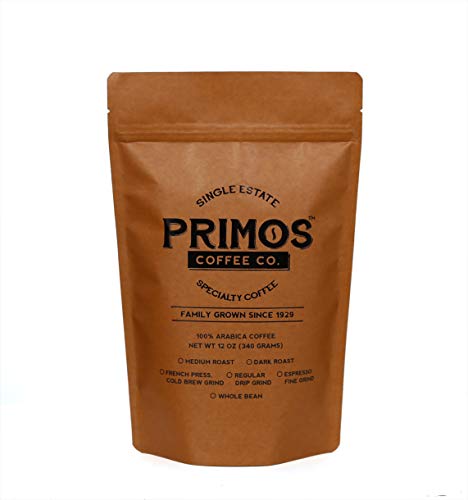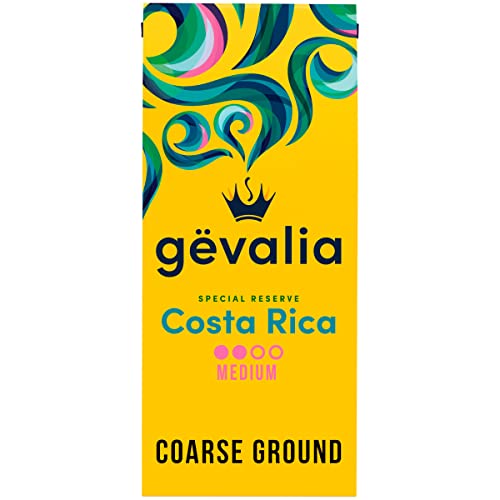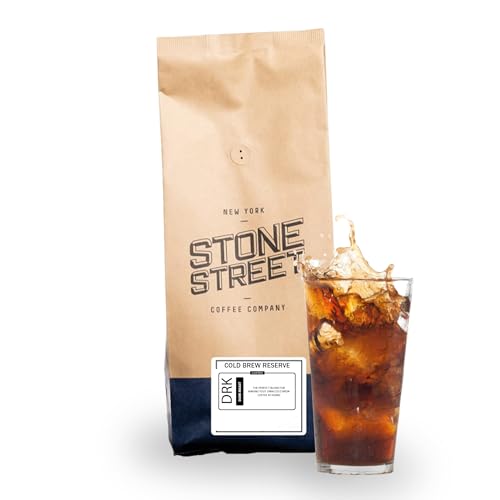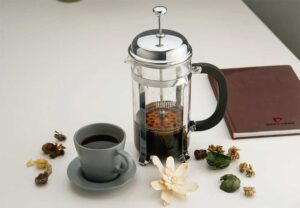What’s worse than that last gritty mouthful of coffee? How about; when the entire pot is ruined by grit? This offense to great coffee is what happens when you put the wrong beans in your French press.
A French press works to slowly draw out the rich flavorings of the coffee grounds. It results in a cup with low acidity, and lots of body. Some coffee aficionados swear by the French press as the only way to brew good coffee – but it needs a grind to match.
Finding good coarse ground coffee isn’t always easy, and we’ve put together a guide to help you make the right choice. We want you to enjoy every sip of coffee, right down to the last mouthful.
6 Best Coarse Ground Coffee for French Press
Primos Coffee Co., French Press Specialty Coffee
Primos 100% Arabica coffee is quality all round. From the initial grind to the lasting flavor that sticks to the tongue, you can trust Primos to create a fine cup.
The medium roast has created a bean that is smooth and sweet, with a low acidity, and a clarifying citrus flavor. The medium body is just right for an everyday cup, as it still has weight without knocking you out. For those who like to savor a cup of coffee in the morning, Primos is perfect. The coffee flavor catches your attention, but it isn’t demanding on the palette.
It’s easy to tell that Primos puts real care into each bag. The coffee is grown in micro-lots in Nicaragua, on a fourth generation farm. They work directly with the locals to create sustainable, fair, coffee beans. This also ensures consistency. Primos never blends, and every bean is selected for quality. If you like the first bag of Primos you try, you’re sure to appreciate the ones that follow.
Each bean is then dried and carefully roasted, to achieve that perfect medium coloring. The coarser grind makes it ideal for a French Press, and the even grounds release magnificent flavor.
This isn’t a coffee with a great deal of punch. However, the medium roast stands up well, and the citrus finish hits just right.
Pros
- Even grind – Works perfectly for the French Press, and can also be used for iced coffee.
- Citrus finish – Provides just enough sweetness, and a real clarity of taste.
- Medium roast – Still has a strong flavor.
- Consistent quality – Produced on a small farm, and never mixed. Each batch is consistently good.
Cons
- Mild – If you like coffee with depth, Primos sits a little light on the tongue.
Gevalia, Special Reserve Costa Rica Ground Coffee
Grown in the mineral rich volcanic soil of Costa Rica, you can almost taste the environment in this Gevalia blend. The citrus undertones can transport you to the foothills of Costa Rica, as the flavor sits on your tongue.
Gevalia beans are slow roasted and snap cooled. This method slowly brings out the deep flavoring, before locking it straight in. That gives the coffee body and weight, without losing any of the delicate citrus.
If you like your coffee black, then you may be surprised by the beautiful clarity that the fruit flavors bring. There’s enough body to impress strong coffee drinkers, but the 100% Arabica beans keeps every sip smooth.
If you’re used to drinking chocolate blends, then let the Gevalia surprise you. Citrus can lighten the cup, and each mouthful has a complete clarity of flavor.
The Gevalia does have a coarse grind, but it’s perhaps slightly finer than some other options. Some French presses with a more open mesh will struggle to filter these out. This is also a great bean option for cold brewing, where the citrus sweetness is heightened by the icy cold.
Pros
- Citrus – Citrus finish coffees have their own unique appeal.
- Aroma – The snap cool locks in the aroma, which rises from the cup.
- Body – Perfect for black coffee, thanks to the medium body.
Cons
- Slightly finer grind – Still coarse, but finer than some.
Stone Street Cold Brew, Coarse Ground Coffee
Dark roast Colombian Arabica beans – that sums up pretty much everything that makes Stone Street so good. It has a simplicity that allows the coffee to take center stage, enhanced by an incredibly even coarse grind that makes it easy to brew.
Stone Street coffee is designed for cold brew. This long, slow brewing process unleashes the sweeter undertones of Stone Street. A chocolate nuttiness emerges, which sits just beneath the coffee bitterness.
If you want your coffee with a stronger hit, then try Stone Street hot brewed. The heating process brings out the body, and gives the coffee a punch. Admittedly, you do lose the delicate balance of flavor. However, what you get in return is a coffee that gets you up in the morning.
Stone Street is a small batch roaster, so you can expect freshness in every bag. And one way they guarantee it is with innovative valve packaging. It ensures that all the aroma stays locked in.
Pros
- Cold brew deliciousness – The absolute best way to enjoy this coffee is by slowly unleashing the flavors overnight.
- Simple flavor – The layers are subtle, allowing the quality of the bean to come through completely.
- Even grind – Coarse grounds are just the right size for a French press.
Cons
- Bitter when hot – Although Stone Street can be brewed hot or cold, the bitterness comes through stronger when hot.
Bulletproof, French Kick Ground Coffee
Bulletproof coffee is certified clean. What that means is that every bean is individually picked to be of the highest quality, sustainably washed and dried, and then tested for impurities before it makes the mug. This results in a pure coffee blend that leaves you free of jitters. Bulletproof are also Rainforest Alliance Certified, working directly with the farmers to ensure a sustainable practice.
But these beans aren’t just worth buying because of their environmental benefits – the flavor is fantastic as well. The French Kick blend is crafted to be smooth and complex. With the first sip you get hints of cinnamon, plum, and orange, bringing a sweet spice to the cup. Then this mellows down to a chocolate and hazelnut finish, with just an undertone of smoke. The dark roast provides depth and body, for a rich cup of coffee.
With each mouthful, you can really taste the quality of the bean. Bulletproof sources their French Kick blend in Guatemala and Colombia, from high altitude farms growing the very best coffee. They’re consistently good, with every pack just as tasty as the last.
Pros
- Certified clean – Tested for toxins, strong coffee with no jitters.
- Rainforest Alliance Certified – Grown sustainably.
- Complex flavor – Hints of spice and citrus fade to a chocolate and hazelnut finish.
Cons
- Poor packaging – For an expensive brand, the packaging feels cheap.
Tim Hortons, Coarse Grind Original Coffee
If you’re a Tim Hortons fan, then you probably already know exactly what you’re getting with this coffee. The fan base for Tim Hortons coffee has been steadily growing for decades, with many making it the coffee shop of choice even over artisan options.
If you haven’t tried Tim Hortons coffee yet, then it’s time to have a taste of the hype – and this coarse grind is absolutely perfect for the French Press. Once brewed, you can inhale the comforting aroma of quality coffee, without having to leave your own home.
Sometimes, what you want for your French Press is a coffee with consistency. A flavor that can get you through the morning, and provide a little get-up and go some afternoons. Tim Hortons is perfectly flavored for any time of day. The rich taste isn’t muddled with tasting notes and unusual aromas – it’s just good coffee. And the grind is spot on. Not a single grain will find its way into your cup.
Coffee is for sharing, and this Tim Hortons blend is sure to be enjoyed by everyone. It hits the spot for lazy mornings, is a solid companion during busy afternoons, and goes great with a catch-up and some gossip.
Pros
- Coarse grind – Tim Hortons have got the grind spot on for the French press.
- 100% Arabica beans – Smooth coffee flavor, with a decent body.
- Consistent quality – You can be sure of what you’re getting with every pack.
Cons
- Mild – The pack says “medium”, but it leans towards “medium-light”.
Bizzy Organic Cold Brew, Coarse Ground Coffee
Bizzy is another brand that has manufactured coffee with the cold brew in mind, but their coarsely ground blend also works well in a French Press.
Almost every coffee drinker will find themselves enchanted with the flavors of Bizzy. With coffee sourced from Nicaragua, Peru, and Guatemala, there’s quality to be found in every bean. The result is a smooth flavor profile, with an undertone of caramel and hazelnut. Sweet, but with a nutty richness. Seasoned coffee drinkers can enjoy Bizzy black, and those with lighter tastes will find it fantastic with a splash of cream.
The flavor does change slightly when hot brewed, but it retains many of the simple notes that make it so delicious. Hot brewed, the bitterness comes through slightly stronger. However, it’s still a good coffee, and sure to please the taste buds.
Bizzy is designed for busy people, who want coffee that will get them through long mornings, and sit with them on lazy weekends. For that, the simple goodness is just right.
Pros
- Certified organic – The globally sourced beans are sustainably and ethically sourced.
- Sweet – The flavor profile, especially when cold brewed, has delightful tones of caramel sweetness.
- Adaptable – Cold brew, hot brew, and with or without milk.
Cons
- Taste changes when hot – Some delicate notes are lost in the hot brew process.
Buyer’s Guide
Getting the right coffee for your French press is a task that we take seriously. With this guide, we can help you pick the best choice for you.
Grind
When buying coffee for your French press, the first thing you need to look for is the grind. A coarse grind is absolutely essential, and there are two good reasons why.
First, finely ground coffee grains will sink through the filter of the French press. This results in those final mouthfuls of coffee being gritty and undrinkable. The finer the grind, the more grains that get through. Coarsely ground coffee is too large, so stays caught in the filter, well away from your cup.
Second, is to do with the flavor release. When water comes into contact with the coffee, that flavor begins to seep out. For a quick brew, fine grains present more surface area, so the coffee flavoring comes through quickly. However, a French press works slower, immersing the coffee in hot water and drawing out the body. Finely ground coffee in a French press turns bitter quickly.
As well as coarseness, you want to look for an even grind. Otherwise, you end up with grit in your coffee. Some variance is to be expected, but you want to avoid any packs which are inconsistent from start to finish. The finest grains will trickle through the filter, and can ruin your perfect cup.
Roast
Deciding on the roast is a balance of preference and method. There are four types of coffee roast: light, medium, medium dark, and dark.
The French press works best in drawing out the body of medium to dark roasted coffee. A light roast can be used, it will just lack power. The darker the roast, the less acidic the flavor, and the richer the taste.
Arabica or Robusta
Many of us will look for the “100% Arabica” marking on packaging without ever fully understanding what it means. There are two main types of coffee bean: Arabica, and Robusta. Robusta has a stronger flavor and more caffeine, which is why the smooth Arabica is preferred by many.
Robusta tends to be used to create cheap and powerful instant coffee. However, a good company can blend the two, softening the impact of Robusta, and maintaining the body.
Acidity
Acidity is something to be avoided in coffee, as it gives a nasty, sharp flavoring. Coarse grinds in a French press is actually one of the best ways to remove this acidity, as the longer brewing time draws out the deeper flavorings.
Cold Brew?
Cold brew and French press are similar ways of brewing coffee, and cold brew can often be done using a French press. The grounds are added to cold water, and over a long period the flavors steep out.
Although you can cold brew any type of coffee, the best way to do it is with blends formulated specifically for the cold brew process. If you drink even amounts of cold and hot brewed coffee, you may want to buy grounds specifically for cold brew.
Frequently Asked Questions
What is a French press?
A French press is a device that brews coffee. The coffee grinds are placed in a beaker, and immersed in hot water. After several minutes of steeping, a mesh filter is pressed down, separating the grinds from the coffee, and releasing the oil that gives coffee its body.
What type of grounds are best for French press coffee?
Coarse grounds are best for using a French press, with a medium to dark roast. This provides flavor and body, and keeps the coffee smooth.
Can you use any type of ground coffee in a French press?
Technically, yes. However, fine coffee grounds will come straight through the filter, and won’t work with the longer brewing time. The end result is a gritty and bitter cup.















